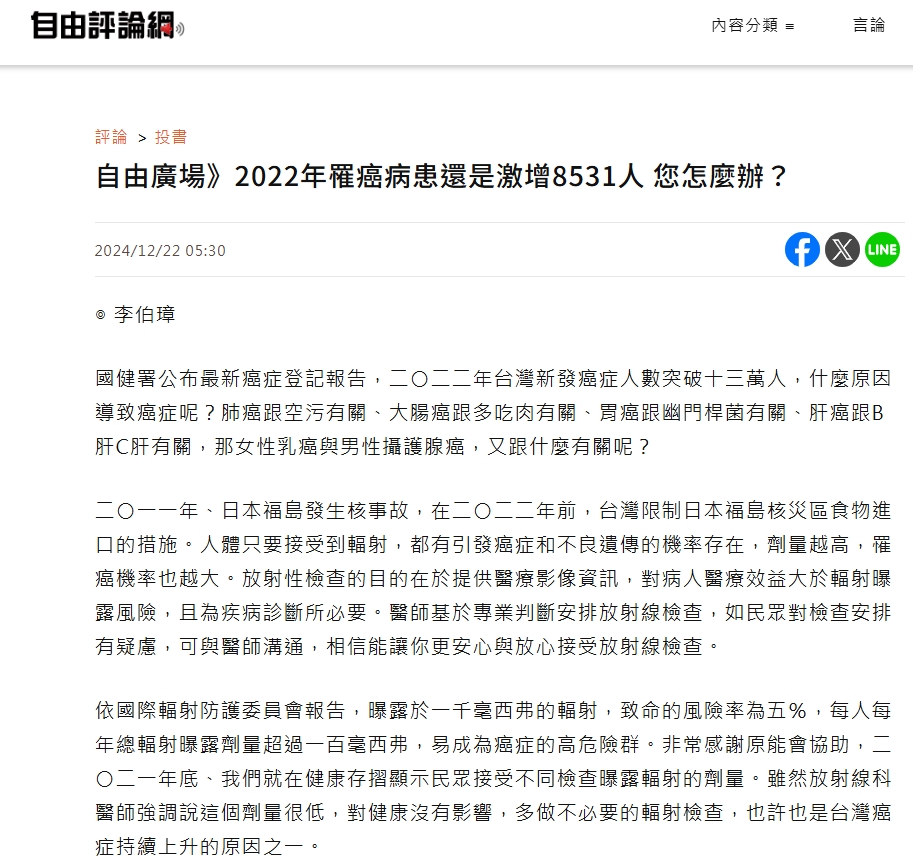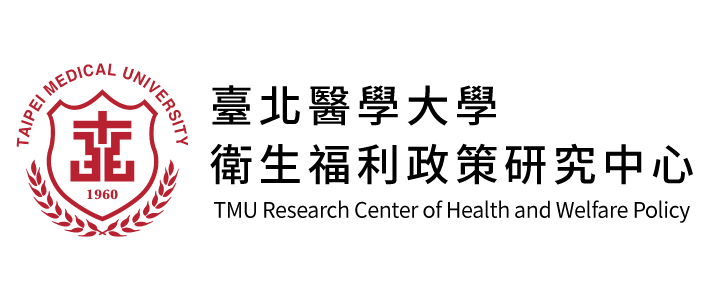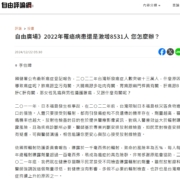【Column Article】Liberty Times Forum《Lee Po-Chang’s Column|8,531 More Cancer Patients in 2022—What Will You Do?》
/in 活動紀事
◎Lee Po-Chang
The National Health Administration has released its latest cancer registry report, revealing that in 2022, the number of new cancer cases in Taiwan exceeded 130,000. What are the causes of cancer? Lung cancer is linked to air pollution, colorectal cancer to high meat consumption, gastric cancer to Helicobacter pylori infection, and liver cancer to hepatitis B and C. But what about female breast cancer and male prostate cancer—what are they associated with?
In 2011, the Fukushima nuclear disaster occurred in Japan. Until 2022, Taiwan had restrictions on food imports from the Fukushima nuclear-affected areas. Any radiation exposure to the human body carries a risk of cancer and genetic mutations, with the likelihood increasing as the radiation dose rises. The purpose of radiological examinations is to provide medical imaging information, offering benefits that outweigh the risks of radiation exposure and making them essential for disease diagnosis. Physicians arrange radiological exams based on professional judgment. If patients have concerns about these examinations, they should discuss them with their doctors for reassurance and peace of mind.
According to the International Commission on Radiological Protection (ICRP), exposure to 1,000 millisieverts (mSv) of radiation carries a 5% fatal risk. Individuals with an annual total radiation exposure exceeding 100 mSv are at high risk for cancer. Thanks to assistance from the Atomic Energy Council, since the end of 2021, radiation exposure doses from various medical examinations have been displayed in Taiwan’s National Health Insurance (NHI) personal health records. Although radiologists emphasize that these doses are low and pose no health risk, unnecessary radiation examinations might be one of the reasons cancer rates continue to rise in Taiwan.
The number of cancer patients in Taiwan has not decreased. Frankly, we do not fully understand the reasons, so how can we effectively control the incidence of new cancer cases? People are deeply concerned about the importation of Fukushima’s food products, yet in Taiwan, patients frequently undergo X-ray and CT scans—not only are many individuals receiving these examinations, but they also undergo them repeatedly. Recently, I saw a post on Facebook stating that a hospital’s outpatient CT scan appointments were fully booked until May next year. Who is stepping forward to question and review this medical practice?
In the past, radiation protection measures were inadequate. For example, in intensive care units (ICUs) with 12 beds, not every patient stayed in an isolation room; some were in open wards. Early in the morning, radiologic technologists routinely performed chest X-rays to monitor patients’ lungs. Due to time constraints, proper radiation shielding for other patients was not always ensured. When the first patient was directly exposed to X-rays, the other 11 patients were also exposed to varying degrees of radiation based on their distance from the source. When imaging the second patient, the other 11 were again exposed, meaning that each patient in the ICU could receive 12 different radiation exposures in a single day. Depending on the length of their ICU stay, these patients accumulated varying radiation doses before discharge. But did this exposure affect their long-term health? This is something that has always weighed heavily on my mind.
Emergency physicians are extremely busy and may not have time to review previous medical records. In one case, a patient underwent 69 CT scans in a single year. I have raised this issue with the Taiwan Society of Emergency Medicine, emphasizing that NHI reform is a shared responsibility of the medical community. The society’s president, Huang Chi-Jen, has also expressed support for better utilization of the cloud-based medical information system. He has issued letters urging emergency physicians to check previous examination reports before ordering new tests. To reduce patients’ cumulative radiation exposure and minimize healthcare workers’ occupational exposure, patients seeking treatment across different hospitals can request their doctors to use the NHI cloud-based system to access prior medical imaging records. By doing so, we hope to decrease the number of new cancer cases in Taiwan.
(The author is a Distinguished Chair Professor at Taipei Medical University’s School of Public Health.)
Original source: Liberty Times Forum, Lee Po-Chang’s Column | 8,531 More Cancer Patients in 2022—What Will You Do?



